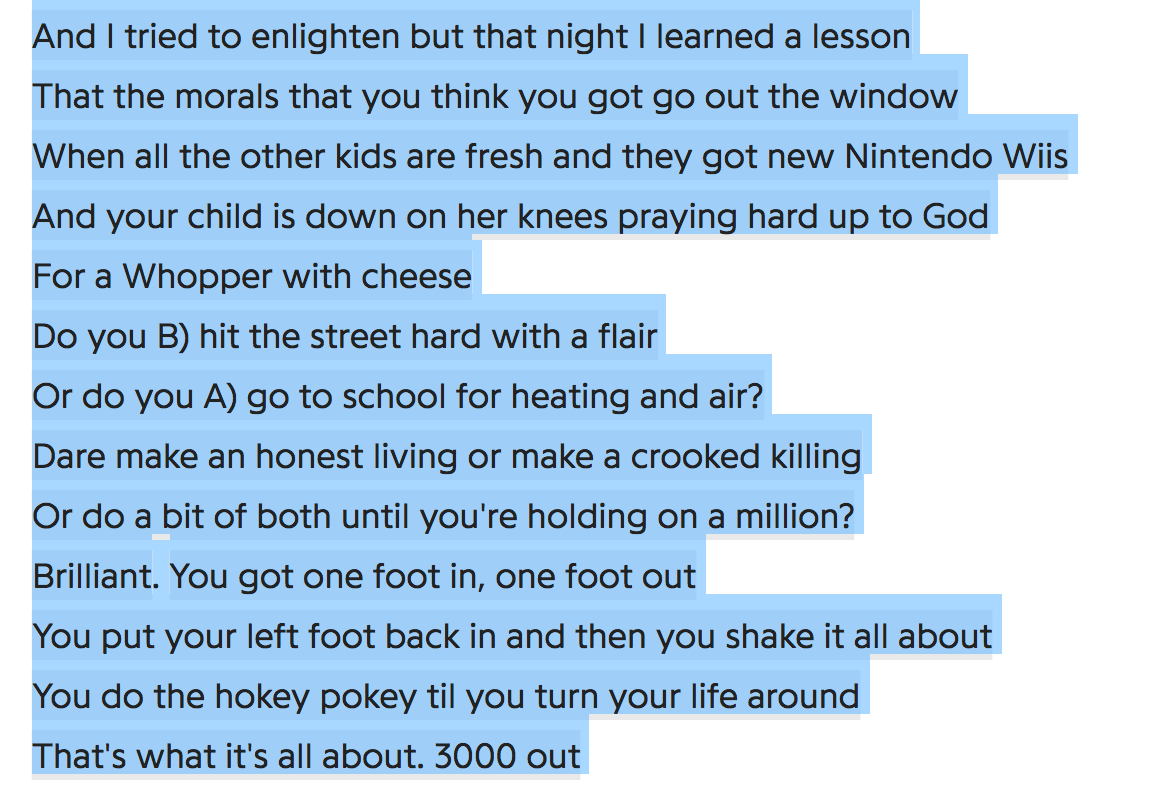noun — a co-workspace for historically disadvantaged people who are searching for an advantage.
Thesis: Trap incentivizes society, which is key for our transition to a largely automated world.
1. First Job
My first job was in a trap.
I never sold drugs, but I worked at a small business where they were sold. Strange enough, I learned more about business there than in college. Here are a few notes from the experience:
- Selling drugs will eventually make you paranoid and insane, you’re also probably destroying your user's life. Trap something positive instead.
- Many talented and smart people are incentivized to sell drugs due to its low barriers to entry.
- Out of necessity, drug dealers invented operations that have now been transferred to legal and positive services. For example, drug dealers have been using an internal Uber-like service for years.
- My last job helped me understand my first job. Two years ago I launched a co-workspace called GF17. We were passionate people with a ton of teaching expertise and a 20,000 square foot space, then my life long dilemma reared its ugly head again: the people who needed my service the most could not afford it. The trap model was victorious again.
- My second to last job also helped me understand my first job. I ran a computer lab at a high school and quickly saw Maslow’s Hierarchy of Needs in motion. One day after class, one of my smartest students walked up to me and said, "Mr. Sadler, I’m not going to lie to you. I sell crack every day when I leave school. That’s how we pay rent and eat." I told him to never go back to that corner, I paid their rent for a few months and found him a job at Dallas Cowboys Stadium. 6 months later he went back to the corner and despite the offering of services, help and more mentorship he couldn’t be talked out of it. The trap had kicked my ass again.
- I’ve been competing and losing to the trap my entire life. The most important lesson learned is perhaps the key to winning against the trap is to become it and redirect all of its negative energy.
- The trap model isn’t wrong, the product being sold is wrong.
"Ya'll think Uber's the future our cars been autonomous"
???????????? New Pusha T x Jay Z https://t.co/YEtj55Ertf
pic.twitter.com/LML4bFaIKc— Nah Right? (@nahright) June 1, 2016
2. The Model
Today in America, you can find four guys in a hacker house working, eating pizza and going days without showering. You’ll find the same in a trap. The only difference is the product that’s being delivered. It is possible to change this product and maintain the value in the trap model.
Trap model is turn-key entry-level skill development, fronted work, high upward mobility potential, product/service delivery and collaborative space.
The other important thing to understand about the trap is how it scales across lower and middle class by welcoming all skill sets.
Beneath all of the evil that exists in this model, there lies perhaps the most interesting education and work model in the country, and a global cultural movement that has exploded through ‘trap music’.
3. Cole’s Law vs. 3000's Law
Have you ever heard of Trap Music? Whether you have or not, you’ve listened to it before. It’s one of the largest cultural explosions of the last 10 years.
I disliked the content of Trap Music for a long time. Despite working in a trap, I related more to J. Cole—a magna cum laude graduate of St. John’s University, and platinum rap artist who tells stories of struggling to pay Sallie Mae back after college and how one should love their life regardless of how bad it may be.
Cole’s Law: Love yours, nothing else matters.
I still believe in Cole’s Law but 3000’s Law provides a different perspective:

3000’s Law is descendent of Maslow’s Hierarchy of Needs. It’s hard to learn, think long term and even act morally when your kids haven’t eaten in a day.
You will likely be determined to feed them and it is at this exact moment that a society is measured by its ability to present a non-violent solution.
4. The Logic of Violence
When the logic of violence changes, society changes. — The Sovereign Individual
The trap is the farm of the future. Decentralized, network-driven and extremely low barriers to entry are just a few reasons why.
The same way the farm altered the logic of violence with new work, the trap will too. It already has in some ways—can you imagine how much more violent the world would be without the ability to make money selling marijuana?
5. Economic Rhythm
Trap Music is very motivating, it doesn’t matter what kind of work you do—you can apply that work to just about every trap verse.
That amazing rhythm isn’t what this post is about though. It’s about how automated economic incentives develop muscle and mind memory.
Basketball, rap, dope dealing, business and digital literacy all have a certain rhythm to them. Chest past—dunk, verse—concert, meeting—check, click—open. The flow of each category is so engaging and incentivized that you start to develop an instinctive approach to every move.
It isn’t very academic, none of those are about writing 40-page papers for no reason. They’re about rhythmically working towards short lucrative outcomes.
Trap Incentivizes the World
With inevitable automation of some work, it’s important that we not only incentivize people to work, but that we also incentivize people to learn and to transition non-violently.
Systems that enable clear and direct paths to currency are a key part of our future. The trap is perhaps the first system of this kind. Trap 2.0 won’t incentivize us to sell grams, instead, it will incentivize us to truly learn new skills, connect with people and do great work.
